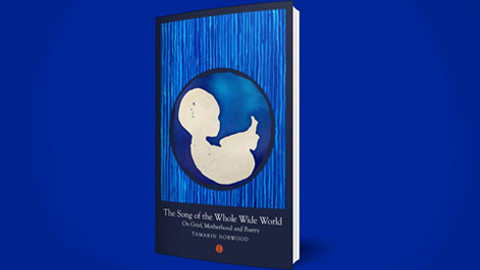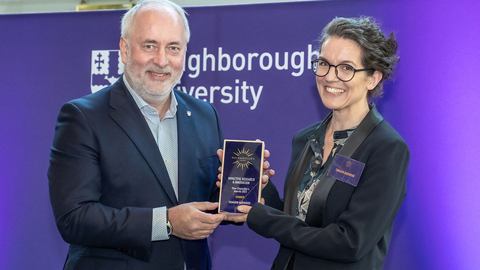Tamarin is an Associate Editor at the BMJ Medical Humanities, a Visiting Scholar at the University of Oxford Centre for Life-Writing (OCLW) and a Visiting Research Fellow at the University of Bath Centre for Death and Society (CDAS). At Loughborough she is a Leverhulme Early Career Fellow (2023-26), working with national pregnancy and baby loss organisations to map the meanings and rituals bereaved families invent when cultural narratives fail to serve them.
Tamarin joined Loughborough as a Doctoral Prize Research Fellow in 2019, having completed her doctorate at the University of Oxford in 2018 where she was a Clarendon Scholar at the Ruskin School of Art. She gained an MFA in Art Writing at Goldsmiths with an AHRC Research Preparation Masters Scheme award (2010), holds a first class BFA Fine Art from Central Saint Martins (2007), and a first class BA Hons in Italian and Linguistics from the University of Oxford (2004).
From 2020-2021 Tamarin convened the Lives in Medicine research network at the University of Oxford Centre for Life-Writing, in collaboration with Johns Hopkins Medical Institutes and in consultation with the Royal Society of Medicine.
In 2021 she won the Wakley Essay Prize in the Lancet with her essay "Something Good Enough", identifying impacts of research-based interventions in neonatal care.
In 2022-3 she was PI on “The Stories we Live By”, a Loughborough research project in collaboration with Held in Our Hearts baby loss charity, bringing therapeutic writing resources to bereaved parents. These are now distributed by NHS hospitals (see Impact and Engagement).
2024 saw the publication of Tamarin's book "The Song of the Whole Wide World: on Grief, Motherhood and Poetry", interpreting her own experience of neonatal death. Her book been added to medical and midwifery curricula in the UK and Australia, and was a World Book Day recommendation by Sands, the UK's principal baby loss charity. It is the subject of two case studies exploring the role of literature in compassionate healthcare training, and has been reviewed widely, including in The Lancet, The Guardian, the Times Literary Supplement (TLS), Life Writing Journal (T&F) and BMJ Medical Humanities (forthcoming). In the Sunday Times it was a feature piece, a mini podcast on BBC Radio, and was a Stylist pick of the best non-fiction for 2024.
Research
Tamarin’s research stands at the intersection of medical humanities, bereavement studies and creativity.
Her current 3-year research fellowship, funded by the Leverhulme Trust, is titled "Emergency Creativity: how parents invent meaning and ritual in reproductive loss".
Fundamental scholarship on the symbolic resonances of death and bereavement on the one hand, and of healthy pregnancy and childbirth on the other, reveal how eloquently birth and death narratives both inform and reveal our wider values and beliefs. Most recently, scholars
have begun to compare and contrast contemporary meanings ascribed to the beginnings and ends of life, noting that compared to death scholarship, childbirth scholarship remains regrettably underrepresented. Yet the distinct meanings and cultural resonances of reproductive loss—when birth and death arrive together, or in the wrong order—have yet to be systematically examined at all.
Parallel blind spots are evident in everyday life. A cultural taboo surrounds reproductive loss to the extent that it is ‘the only type of loss in Western society [with] no culturally sanctioned rituals or traditions to help the bereaved say goodbye’; in their place an ‘active culture of denial and intellectualisation’ can discourage and invalidate parental grief (Markin, Rayna D. et al. 2018. ‘Cultural Processes in Psychotherapy for Perinatal Loss: Breaking the Cultural Taboo against Perinatal Grief.’ Psychotherapy 55, no. 1: 20-26.). The meanings parents ascribe to their loss are thus undervalued, even by the parents themselves, and seldom shared. Reproductive loss is sadly very common: in the UK alone a baby dies near birth every two hours, and one in five further pregnancies ends in miscarriage, with Black and Asian parents, and parents from deprived areas, disproportionately at risk. These blind spots therefore represent a significant omission in birth and death scholarship, which moreover perpetuates existing inequities by failing to represent the diversity of birth, death and parenthood experiences.
Her research has contributed to a small but growing body of evidence indicating that when parents have the chance to express what reproductive loss means to them, their accounts are highly creative by necessity, making up for this absence of tradition by inventing their own, borrowing from multiple sources to create ad hoc rituals, symbols, stories and metaphors. Such accounts stand to richly reorient established birth and death narratives across several axes.
This project is the first systematic study of the sense-making narratives bereaved parents are creating for themselves, using open-ended interviews and methodologically innovative writing workshops amenable to the ambiguous and disorganised character of reproductive loss experience. By over-representing groups under-served by baby loss support (Black and Asian parents, parents of derived areas, fathers, non-birthing partners, LGBTQI+ parents), the study will redress inequalities inherited when research draws upon groups already accessing baby loss support, to create and contextualise an inclusive picture of the distinct cultural and symbolic resonances of reproductive loss in the UK.
Impact and engagement
In 2023 Tamarin was awarded the Vice Chancellor's Award for Impactful Research and Innovation at Loughborough University. This award recognised her collaboration with Scottish baby loss charity Held in Our Hearts to deliver new resources for parents bereaved by baby loss. These resources draw upon her research to encourage bereaved parents to try writing as a way to make sense of their grief experiences. The resources are now distributed by five NHS Boards in Scotland, and are now being taken up by NHS Trusts in England too.

